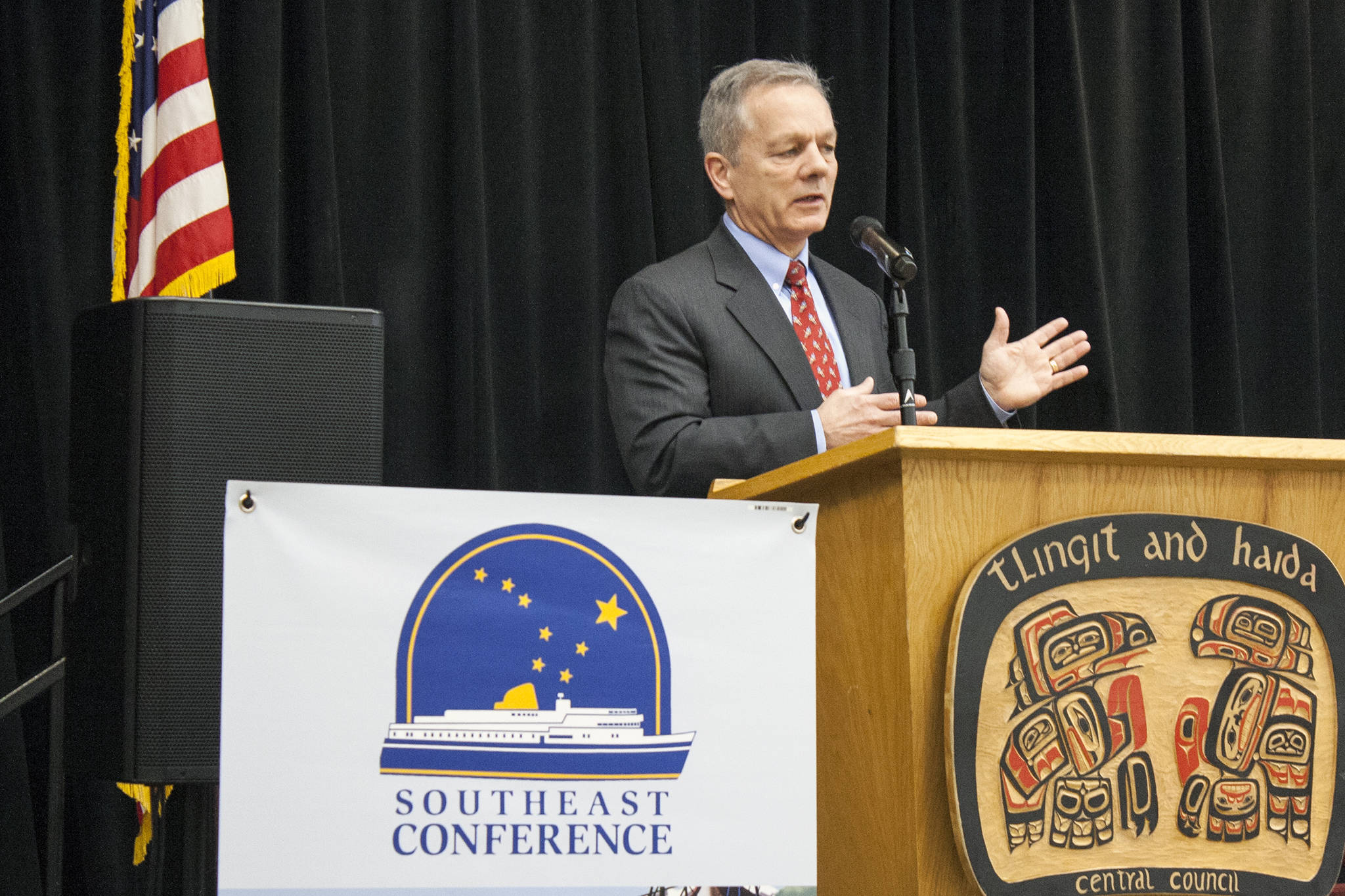The Dunleavy administration recognizes Alaska Marine Highway System is a problem for Southeast Alaska, and actions taken this week could be part of a forthcoming solution, said the governor’s chief of staff Ben Stevens.
Stevens, who was the morning keynote speaker at Tuesday’s Southeast Conference’s Mid-Session Summit, focused the early portion of his remarks on the state’s ailing ferry system that functions as a highway for disparate communities in coastal Alaska.
“I come from a business where if your boats don’t work, you don’t work,” Stevens said. “The No. 1 priority of this administration for the Marine Highway System is to get boats operating because they’re not.”
[Live coverage from the summit]
He said the supplemental budget, which will come out Wednesday, will contain funding to help accomplish that goal.
“The supplemental budget will have $12.5 million of spending from the Marine Highway fund of spending for the Marine Highway,” Stevens said.
He said of that sum, $5 million will go to get the M/V LeConte back in service as quickly as possible.
“That’s money that’s going to become available as soon as the Legislature takes action on that bill,” Stevens said.
During his brief remarks, Stevens also highlighted achievements of the administration that he said have been sometimes overlooked.
That included ongoing progress toward building more roads in Southeast Alaska, including roads from Sitka to Katlian Bay and a Kake-Petersburg road.
“The point I’m trying to exemplify is there’s construction going for roads in Southeast Alaska, which will help to alleviate some of the distribution problems as well as transportation problems,” Stevens said.
New road could be coming to the outer reaches of Juneau, too.
Stevens said the Juneau Access Project is still being considered and progress is being made toward a seasonal terminal at Cascade Point. That site would 30 miles north of the Auke Bay terminal and a few miles past the end of the existing road system. It would ensure day boats connect Juneau with Haines and Skagway.
[State considers adding terminal in Juneau for new ferries]
“We’ve asked for DOT to look at the Cascade Point terminal, and so they’re about ready to bring forth a proposal that takes the road to Cascade Point and puts in a seasonal ferry terminal there that would be a joint operation with Goldbelt,” Stevens said. “That project is moving forward. We’re working under the impression the farther we get the road north, the better advancement we have.”
Interim President and CEO for Goldbelt, Inc. McHugh Pierre said in a phone interview Goldbelt’s involvement is driven by the proposed location of the terminal, which would be on land owned by Goldbelt. Pierre also said the plan is not especially new and Goldbelt has been part of talks since 2015.
“Goldbelt’s willing to work with DOT, and we’re open to making this solution take place,” Pierre said.
He would not specify if Goldbelt would also use the site for business purposes or assist with some aspect of operations.
“Everything is up for discussion, we don’t know for sure what DOT wants to do,” Pierre said.
However, Pierre said Goldbelt views multiple ferry runs per day up northern Lynn Canal as beneficial to the community and Goldbelt shareholders.
“We need a ferry system,” Pierre said. “We need to have that transportation into our community.”
An evolving administration
Stevens also spoke to the administration’s changing approach to the state budget.
Dunleavy’s latest proposed budget did not feature the dramatic cuts that characterized his first proposed budget.
Those cuts — and later line-item vetoes — led to multiple special legislative sessions and statewide protests. There was also a personnel shakeup in the late summer months.
[Ferry supporters flood Capitol steps]
Stevens in late July replaced Tuckerman Babcock as the governor’s chief of staff, and in mid-September former Office of Management and Budget Director Donna Arduin stepped down.
“All administrations go through an evolution, a progression,” Stevens said during the conference. “Any effective manager — whether it be a business, whether it be a school district, or whether it be a government — has to go through an evolution to meet reality.”
He said the governor has adjusted his approach to the budget to reflect no one entity can single-handedly pass the budget.
Stevens, who previously served as president of the state senate, said last year’s budget started conversations that are continuing today. He also said the administration is committed to working with the Legislature to produce a state spending limit. A sustainable spending limit remains a priority of the administration, Stevens said.
“We’re going to work with the Legislature, and we’re going to listen to the Legislature to try to find a way to get a sustainable mechanism in place that will become attractive for people to invest in and create a long-term stable economic environment for job creation and economic growth,” Stevens said.
• Contact reporter Ben Hohenstatt at (907)523-2243 or bhohenstatt@juneauempire.com. Follow him on Twitter at @BenHohenstatt.

